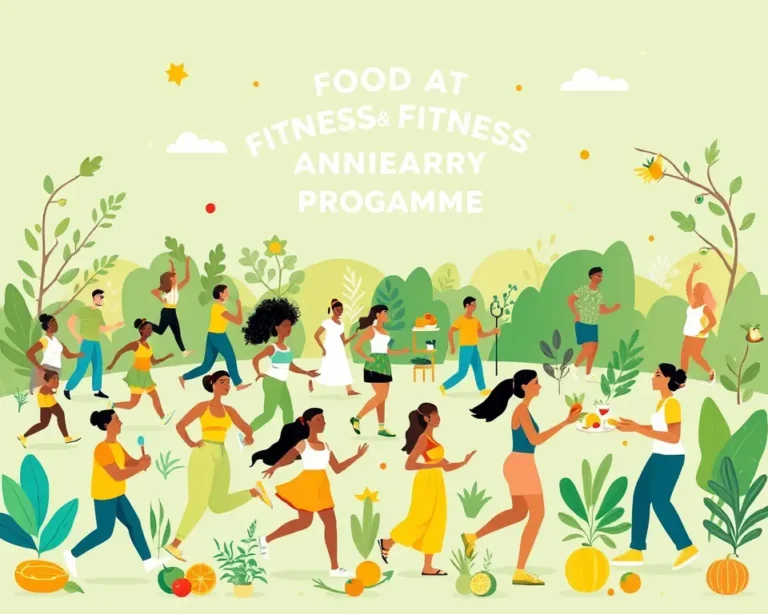For over two decades, the Food and Fitness Programme has been a cornerstone of health education, positively impacting countless lives. In 2025, this unique initiative celebrates a significant milestone, marking years of dedication to promoting healthy lifestyles among primary school children, their families, and educators. Originating in Northern Ireland, the program’s reach and influence have grown exponentially, driven by its engaging approach to nutrition and physical activity.
A Legacy of Promoting Health and Wellness
The Food and Fitness Programme has consistently delivered crucial messages about healthy living. Its curriculum emphasizes the importance of a balanced diet, highlighting the nutritional benefits of dairy products. The program’s enduring success lies in its ability to connect with its audience, making learning about health fun and accessible.
Key Themes and Educational Impact
The program’s success stems from its interactive and engaging format. Key stage 2 Primary 5 and 6 children actively participate in presentations designed to enhance their understanding of health and nutrition. These presentations cover essential topics such as:
- The importance of a balanced diet
- The role of physical activity in maintaining good health
- The benefits of incorporating dairy into a healthy eating plan
Evaluations have consistently shown that participation in the Food and Fitness Programme significantly improves children’s knowledge and attitudes towards healthy lifestyles. The program enhances children’s understanding of healthy eating and activity, and improves their understanding of the role of dairy foods in the diet.
The Secret to Success: Generation Z Engaging Generation Alpha
A unique aspect of the Food and Fitness Programme is its delivery model. The program is facilitated by undergraduate students undertaking industrial placements, who are specially trained by the Dairy Council. This approach fosters a relatable dynamic between the presenters (Generation Z) and the primary school children (Generation Alpha). This near-peer interaction enhances the program’s credibility and effectiveness, as the young presenters can communicate health messages in a way that resonates with the children.
Adapting to a Changing World
The Food and Fitness Programme has demonstrated remarkable adaptability, particularly in response to the challenges posed by the COVID-19 pandemic. When in-person presentations were not possible, the program transitioned to a virtual format, ensuring that children did not miss out on vital health education. A video resource was created and made available on the Dairy Council website, maintaining the program’s reach and impact during a challenging period.
Fueling Demand Through Positive Feedback
The Food and Fitness Programme is fully funded by the Dairy Council and offered to schools free of charge. Demand for the program is driven by positive feedback and requests from primary school teachers, who recognize its value as a fundamental component of their curriculum. Each year, teachers are reminded of the program’s availability, ensuring a steady stream of interest and participation. The current academic year is expected to see around 24,000 Key Stage 2 Primary 5 and 6 children from schools across Northern Ireland benefit from the program. This is based on approximately three presentations per day, with the team actively engaging with pupils at each session.
Trends Shaping the Future of Food and Fitness
As the Food and Fitness Programme looks ahead, it’s essential to consider the broader trends shaping the landscape of health, nutrition, and fitness. Several key developments are poised to influence how people approach healthy living in the coming years:
The Rise of Personalized Nutrition
The concept of personalized nutrition is gaining momentum, recognizing that dietary needs vary significantly from person to person. Factors such as genetics, lifestyle, and individual health conditions play a crucial role in determining the optimal diet for each individual. This trend is supported by advances in technology and data analysis, making it easier to gather and interpret personal health information.
Technology-Driven Fitness
Wearable technology and mobile exercise apps continue to dominate the fitness industry. These tools provide users with real-time data on their activity levels, heart rate, sleep patterns, and more, empowering them to make informed decisions about their health. Data-driven training methods are also becoming increasingly popular, allowing individuals to track their progress and optimize their workouts.
Functional Fitness and Strength Training
Functional fitness, which focuses on exercises that mimic everyday movements, is gaining traction as people seek to improve their overall physical function and mobility. Strength training is also experiencing a resurgence, with more people recognizing its importance for bone health, muscle mass, and overall well-being.
Food as Medicine
There is a growing recognition of the power of food as medicine, with people increasingly turning to healthy diets to prevent and manage chronic diseases. This trend is driven by a desire for more holistic approaches to health, with individuals seeking to address the root causes of illness rather than simply treating symptoms.
Emphasis on Mental Wellness
The connection between physical and mental health is becoming increasingly clear, with more people prioritizing mindfulness and stress reduction techniques. Practices such as meditation, yoga, and spending time in nature are gaining popularity as tools for improving overall well-being.
Integrating Emerging Trends
To remain relevant and effective, the Food and Fitness Programme can consider integrating these emerging trends into its curriculum and delivery methods. This could involve:
- Incorporating personalized nutrition advice, tailored to different age groups and dietary needs.
- Utilizing wearable technology and mobile apps to track participants’ activity levels and provide feedback.
- Introducing functional fitness exercises that can be easily incorporated into daily routines.
- Emphasizing the role of food in preventing and managing chronic diseases.
- Promoting mindfulness and stress reduction techniques to support mental well-being.
A Lasting Impact on Future Generations
As the Food and Fitness Programme celebrates its milestone anniversary, it’s clear that this initiative has made a lasting impact on the health and well-being of countless individuals. By consistently delivering engaging and informative health education, the program has empowered children, families, and educators to make positive changes in their lives. As the program looks to the future, it remains committed to adapting and innovating to meet the evolving needs of the communities it serves, ensuring that future generations have the knowledge and tools they need to live healthy, fulfilling lives.







